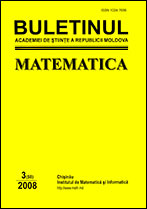|
|
Buletinul Academiei de Ştiinţe a Republicii Moldova. Matematica, 2014, Number 3, Pages 23–29
(Mi basm372)
|
 |
|
 |
This article is cited in 1 scientific paper (total in 1 paper)
Bi-deniable public-key encryption protocol which is secure against active coercive adversary
A. A. Moldovyana, N. A. Moldovyanb, V. A. Shcherbacovc
a Saint-Petersburg National Research University of Information Technologies, Mechanics and Optics, Kronverksky pr., 10, St. Petersburg, 197101 Russia
b Saint-Petersburg Electrotechnical University "LETI", Prof. Popova str., 5, St. Petersburg, 197342 Russia
c Institute of Mathematics and Computer Science, Academy of Sciences of Moldova, Academiei str. 5, MD-2028, Chişinău, Moldova
Abstract:
We consider a practical public-key deniable encryption protocol based on the RSA cryptosystem. The protocol begins with the authentication of the both parties participating in the protocol (the sender and the receiver of secret message). The authentication is performed by exchanging random values and the RSA signatures to them. Due to this stage of the protocol the security against coercive attacks of the active adversary is provided. After the mutual authentication the protocol specifies performing the deniable encryption of the secret message, like the probabilistic ciphering of some fake message by using the RSA encryption algorithm. The novelty of the proposed protocol consists in using random values as single-use public keys that are used to generate single-use shared key with which the sender encrypts the secret message and the receiver discloses it. The coercive adversary provided with private keys of the both parties can only disclose the fake message. Proving that the sent cryptogram contains a message different from the fake one is computationally infeasible for the adversary.
Keywords and phrases:
cryptographic protocols, public-key encryption, deniable encryption, probabilistic ciphering, factoring problem, entity authentication.
Received: 02.04.2014
Citation:
A. A. Moldovyan, N. A. Moldovyan, V. A. Shcherbacov, “Bi-deniable public-key encryption protocol which is secure against active coercive adversary”, Bul. Acad. Ştiinţe Repub. Mold. Mat., 2014, no. 3, 23–29
Linking options:
https://www.mathnet.ru/eng/basm372 https://www.mathnet.ru/eng/basm/y2014/i3/p23
|

|




 Contact us:
Contact us: Terms of Use
Terms of Use
 Registration to the website
Registration to the website Logotypes
Logotypes








 Citation in format
Citation in format 
